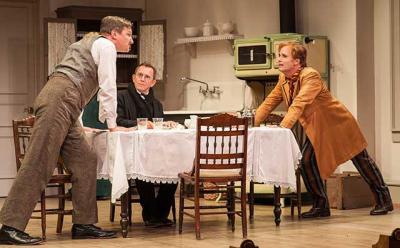Farce With a Capital F At Guild Hall

While many are aware that the actor and comedian Steve Martin also has a vigorous writing career, few are aware of how many of these genres he has excelled in. There are the screenplays, which include the hit films “The Jerk” and “L.A. Story”; the novels, including the bestseller “Shopgirl”; the essays for The New Yorker, and the plays, including the popular “Picasso at the Lapin Agile.” As a writer, Mr. Martin doesn’t exactly plumb the Dostoevskian depths of the human soul: He tends toward light, breezy comedy that utilizes his broad West Coast sensibility. He is a writer who understands his authorial limits, and keeping his ambitions modest usually nails what he sets out to accomplish.
This must be what attracted Mr. Martin to adapt Carl Sternheim’s farcical play “The Underpants,” a production of which is running through June 26 at East Hampton’s John Drew Theater at Guild Hall. Sternheim’s original, “Die Hose,” was written in 1910 and utilizes comedy that doubles as a critique of German bourgeois culture at the fin de siecle. Though funny and well acted, audiences should be aware that this current production of Mr. Martin’s “Underpants” is performed as farce with a capital F.
The setting is an average apartment in Dusseldorf where scandal has just befallen a young married couple, Theo and Louise Maske. While attending a parade for the king, Louise’s underwear has mysteriously fallen to her ankles, an event witnessed by a large crowd. The young woman is now the focus of much gossip in the city and is a source great consternation for her husband. Theo is a government clerk of the most middling kind. Petty, unimaginative, and obsessed with security, he is petrified that his wife’s scandal will cost him his job. “Look what you’ve done to me!” he exclaims with typical self-centeredness, to which Louise replies, “I didn’t do anything to you.” The marriage, we soon learn, is teetering.
Enter Versati, the young poet. The Maskes have an empty room to rent, and the poet is highly motivated to occupy it — he has beheld firsthand Louise’s dropped undergarment and is dutifully impressed. Left alone with her, he peppers the wife with snippets of half-baked romantic poetry. Egged on by Gertrude, a spinster neighbor who lives vicariously through Louise, the young wife becomes smitten with him. To consummate this attraction, however, the two will have to go through Benjamin Cohen, a nebbishy barber who also lusts for Louise and will come to share the empty room with Versati.
It’s not clear exactly why Mr. Martin thought this material would have resonance for a contemporary audience. By today’s standards, Louise’s wardrobe malfunction seems like the height of innocence. And in the age of Tinder and internet pornography, sexual repression isn’t a particularly acute American problem. The play’s feminist element seems especially dated: Theo browbeats Louise as a silly toy wife. (There is even a birdcage prop as part of the set, meant as a metaphor for her life.) But who believes anymore that women are being encouraged to stay home and play house?
Of course, a play doesn’t have to be fully in line with contemporary mores to be funny, and “The Underpants” has plenty of laughs. Most of these come from the many double entendres that Mr. Martin manages to mine from the original German, and particularly as uttered by Theo, played with blustery vigor by Mark David Watson. Speaking of the gossip about Louise’s fallen bloomers, for example, Theo says it has “spread by itself.” And when he makes a pass at Gertrude, who rebuffs him by stating that she’s too old, he replies that “rivers of water can still flow through rusty pipes” — a joke that got plenty of guffaws from the middle-aged Guild Hall crowd.
Among the other noteworthy performances was one by Marianna McClellan, who plays Louise in a state of breathy anticipation, as if forever on the brink of the orgasm she so desperately needs. Sabrina Profitt, meanwhile, plays Gertrude with sure-fire timing, effortlessly capturing the nosy neighbor who builds intrigue out of boredom.
And let no one say Daniel Passer plays it safe with his portrayal of the poet Versati. In fact, there may be moments where you think the director, Bill Fennelly, has let him (or encouraged him, for all we know) wander too far into histrionics. With his rrrrolllinggg consonants and outrageously emphatic head and hand gestures, his performance almost becomes a parody of itself. Still, there is pleasure in watching an actor going big with a risky performance.
So the “The Underpants” begs questions: How broad is too broad? When does farce become absurdity? This current production, I believe, crosses the line and then pulls it back again, sometimes from one moment to the next. All of which makes for a fun, if uneven, night of theater.
